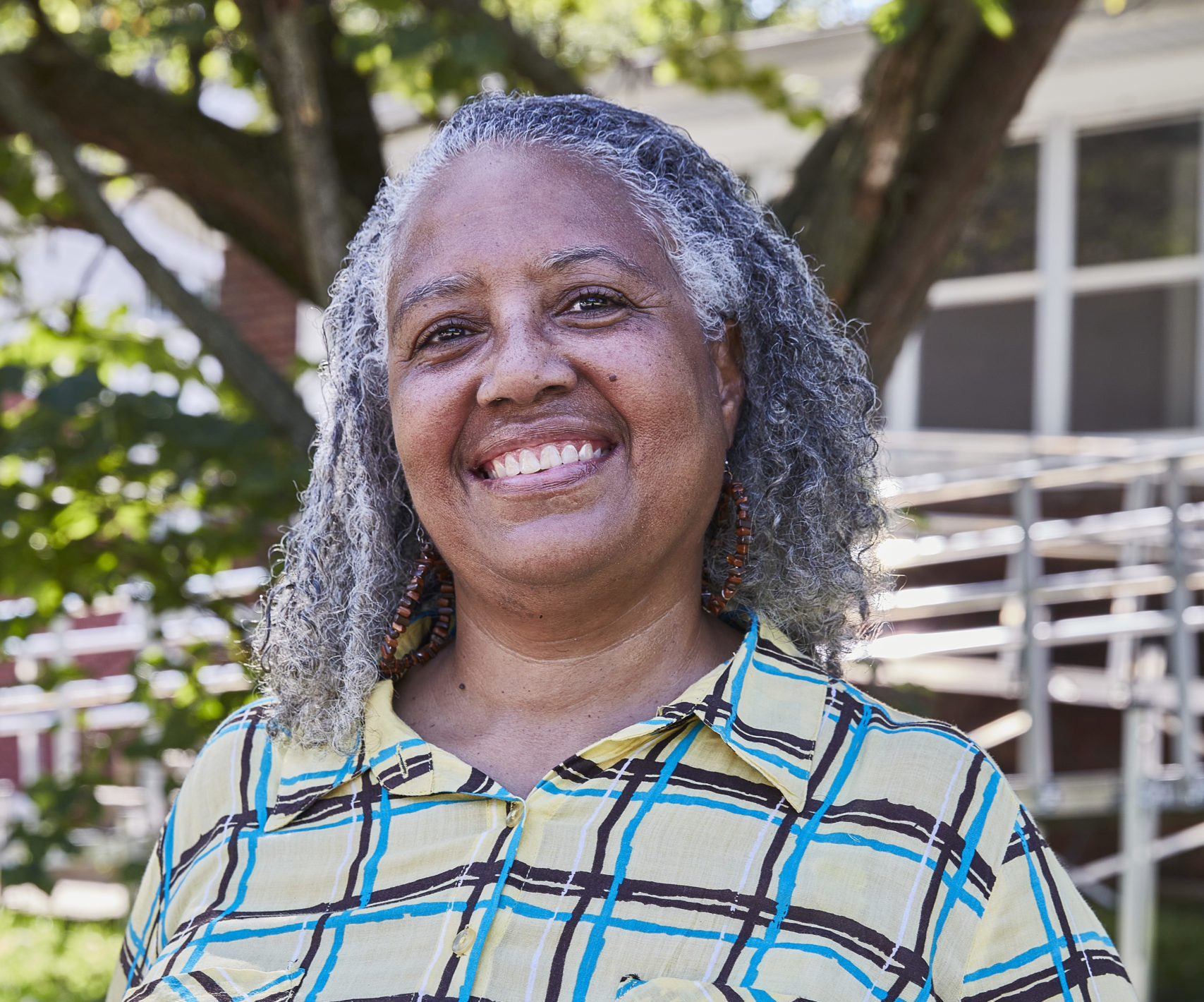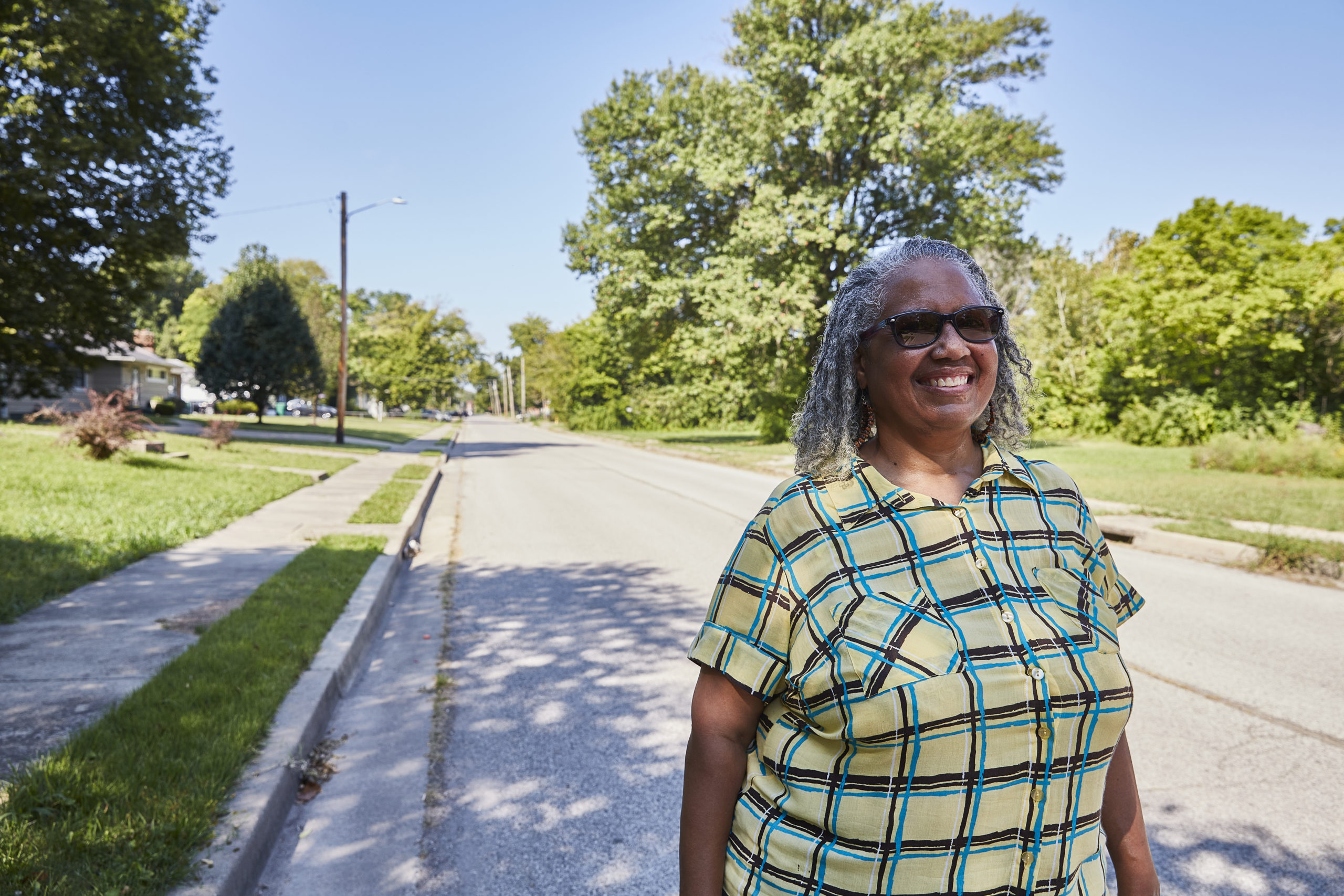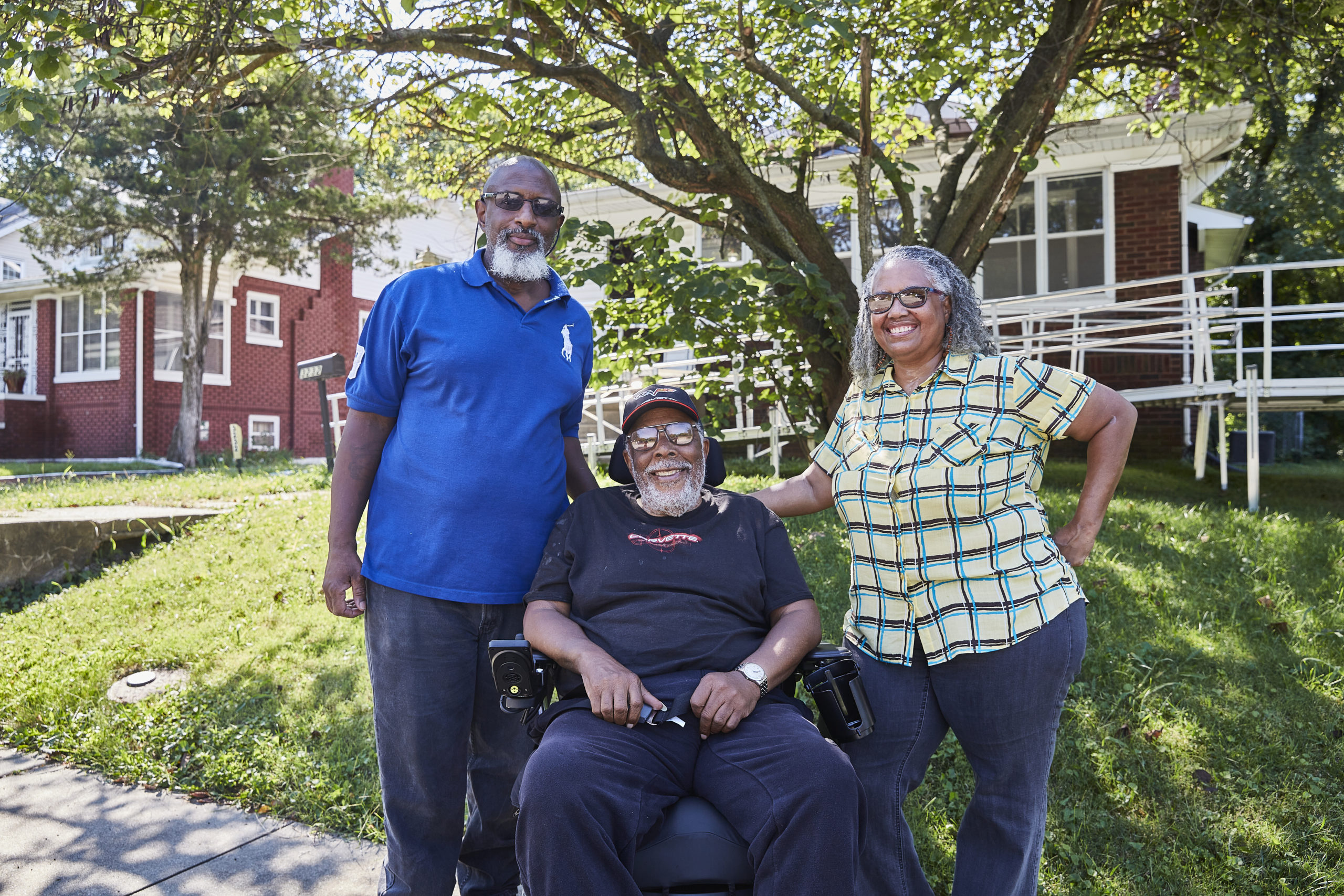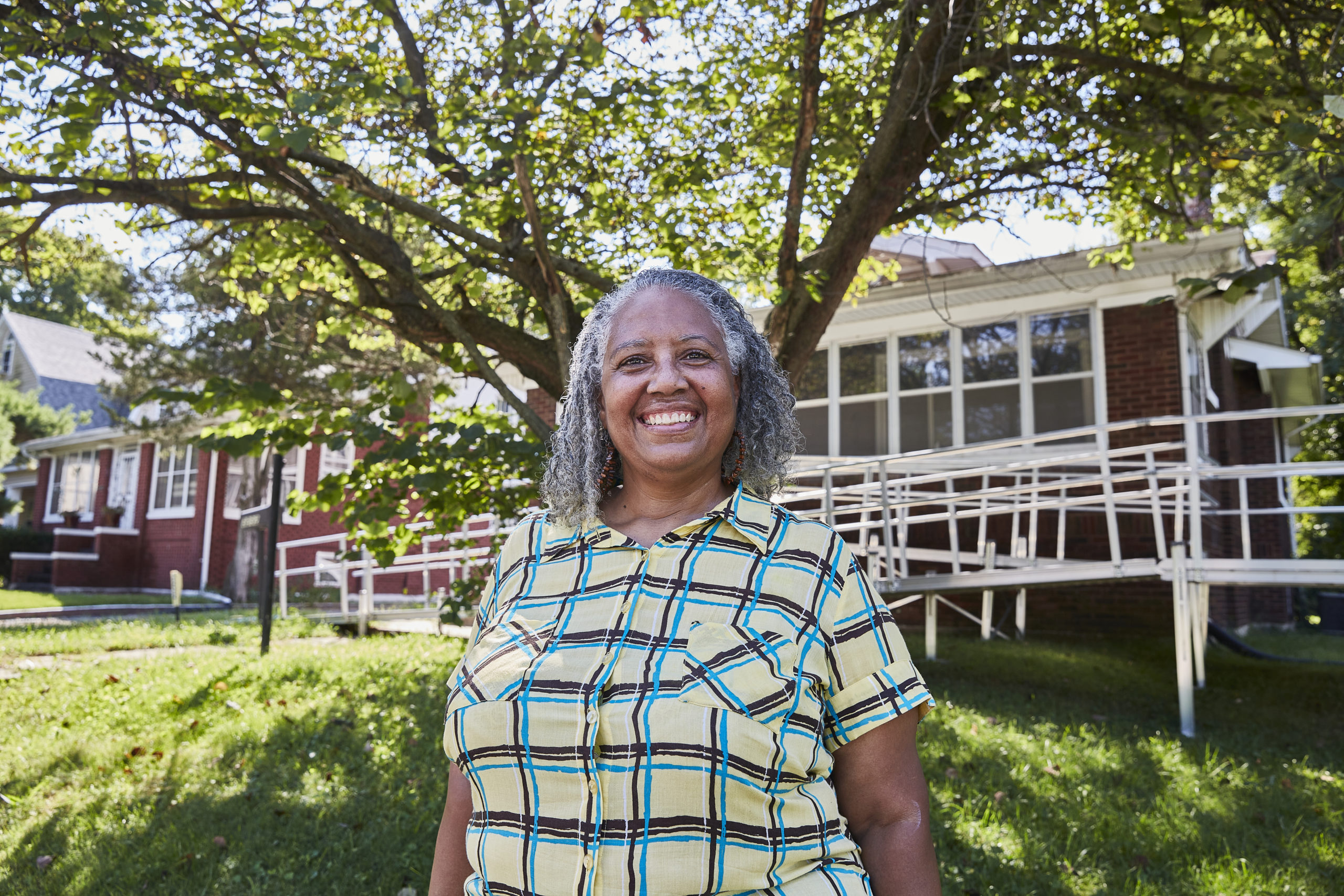A Catalyst for Change
September 20, 2021
A Catalyst for Change
By Marie Franklin

Marie Franklin is a mother, grandmother, caretaker, leader, community organizer, Chisholm’s Chair alum, and life-long East St. Louis resident. Photo by Izaiah Johnson.
“I am and always will be a catalyst for change.” -Shirley Chisholm
Our street was horrible. It was barely passable in a car and you had to get your front end aligned every month ‘cause you had to navigate so much around big huge potholes. Individually, us neighbors had been going down to City Hall saying, “Hey, our street is terrible. What are you guys gonna do about this?” And of course, nothing was getting done.
I had bought a house two doors down from where I grew up, so my mom lives just down the street and we knew all our neighbors. So us neighbors, we came together and formed an organization called Concerned Citizens of Precinct 12. I got voted in as president, my mom was the secretary, and another neighbor was vice president. We began getting some of our other neighbors involved, too. We went down to City Hall as a collective voice to get our street fixed. And we did -- our street finally got fixed! But it took them almost 15 years.
The school district in our city is under state oversight, so our superintendent doesn’t live here and he never has. And I just always feel like that makes a difference. He doesn’t see us as ‘his’ people. He sees us as ‘those’ people. And with that perspective, every decision he makes is based on doing stuff with ‘those’ people instead of ‘us.’ We’ve got this culture of people who don’t even live here doing you favors, and look where it has gotten us.
When I was a little girl here in East St. Louis, we had everything we needed in our neighborhood. We didn’t have to go out of the area for anything unless we chose to. In 1971, my family moved into this neighborhood and we were the second Black family here. And by 1981, a decade later, there were no White people. They were all gone.
It started with White flight, and then just went downhill from there. The citizens got nothing. We were left to struggle here by ourselves. No place in this country with a city sitting on the riverfront would be allowed to decline if it had been full of White people. Somebody would have stepped in and done something--the state, the county, the federal government-- somebody. Oh no, East St. Louis would not have been allowed to decline and be intentionally divested in like this if it had not been full of Black people.
“Around here, there’s currently this culture of if you need something as a citizen, you have to get somebody to do you a favor.”
In 2013, I was invited to a weekend event for women who wanted to run for public office. This invitation kind of clarified an inkling I had been having inside -- this sense of, “I’m tired of asking these people to do the right thing, so I’m just gonna have to do it myself.” The weekend event put new things on my radar about building a public life for one’s community. What to think about if you’re going to run for a public office, what it looks like, and things like that. When it ended, my mind had shifted. I left thinking, “I think I can do this. I’m not sure when I’m gonna do it, or how, but for some reason I needed that information.” It was just a far off mirage at that time, not yet fleshed out, but it was clear that this was something coming for my future.

Marie on the street she grew up on. Photo by Izaiah Johnson.
As I got more interested in this idea, other powerful trainings came across my radar, too. A week-long leadership and organizing training through the Gamaliel Network, and a multi-month training called the Power Building Academy through WEPOWER. I’ll tell you, what I learned in these training sessions was vital. They taught us about building power, how we are deserving of a public life, and how current political systems work to keep us powerless. How they keep us from getting the things that we deserve as citizens. People who are in power try to tell regular citizens that, “Oh well, no, let us handle that. You don’t need to be involved in that” and “Oh no, no, you don’t need to worry about that kind of stuff.” It fosters the belief that you don’t have power, that you’re not supposed to have power, and that that’s something smarter, bigger, brighter, and richer people do.
I want everyone to know this stuff, and to know it in their bones. I began wondering, how do we get other people involved? How do I get our residents involved in our city, and get them to the point where they feel like their voice matters?
“You don’t make progress by standing on the sidelines, whimpering and complaining. You make progress by implementing ideas.” -Shirley Chisholm
All of my jobs and volunteer work have basically revolved around helping the citizens and revitalizing my city. I’ve most recently been working as a leader and community organizer at United Congregations of Metro-East and I’ve worked to engage our school district on areas to make it more conducive for parent involvement, help get the No-Cash Bail law passed in Illinois and keep it in place, get ex-incarcerated people organizing, and even help start our own chapter of Ntosake, and international women’s leadership group, here in East St. Louis. Ntosake is an African term which means, “she who walks with lions and carries her own things.”
Through my work and training I learned of Chisholm’s Chair, another initiative through WEPOWER that is based on the legacy and power of the late Congresswoman Shirley Chisholm. It is a training space for Black and Latinx women who are considering running for some form of public office. When I got word of this training, something inside me that I felt back in 2013 stirred again-- that thought about running for office. It was a confirmation of a vision I have for myself and my path to power. I just had a feeling that this was something I needed to do.
The programming of Chisholm’s Chair connected all the dots for me about how it looks and feels to have a campaign, run a campaign, participate in an election, and be a public official. It put more flesh on the bones of my vision. I entered the program hoping for more clarity on if I should run for public office and when I should do it, and I got both.

Sam Franklin, Marie’s husband, James Davis, Marie’s father, and Marie together. “Although they were not direct members of the Concerned Citizens of Precinct 12,” Marie says of Sam and James, “if we needed some muscle, they were always available to help.” Photo by Izaiah Johnson.
I don’t ever want to be the smartest person in the room. If I’m the smartest person in the room then I’m in the wrong room. And this program, it got me connected to some beautiful women who are ‘smart as a whip,’ as my grandma used to say! Each of us has our own aspirations about being on the school board or other public positions. We became a think-tank and support for each other and that still carries on today. About once a month now, some members from my cohort of powerful women connect and reinforce each other with our visions and paths into power. I get their honest input, support, and their belief in me, and I share mine with them as well.
Oh honey, and let me tell you, being in a space exclusively for Black and Latinx women was liberating. It was inspiring to see these young women stand in their power and harness it across various arenas. You could say stuff and the others would go, “Mmmm-hmm.” You didn’t have to explain. You didn’t have to use your White girl voice and speak in perfect King’s English. You could use a little Ebonics and they would get it. Chisholm’s Chair was awesome. It was just perfect.
We women are magic. We always have been and we always will be. And we need to walk in that.
“People, your requests are not favors. We deserve to live in a thriving city, and we deserve that the people who represent us make decisions that bring all of us into that place.”
Like I said earlier, around here there’s currently this culture of if you need something as a citizen, you have to get somebody to do you a favor. You gotta call your precinct committeeman and ask him, and then he has to ask the people at City Hall to do x, y, and z, and see if they’ll do him a favor for you. People, your requests are not favors. You are a citizen. You deserve this. We deserve to live in a thriving city, and we deserve that the people who represent us make decisions that bring all of us into that place. We should have that, and there is absolutely no acceptable reason why we shouldn’t.
I see East St. Louis as a microcosm of all the issues that Black and Brown people have throughout the country, and so if we can fix things here, we can take it on the road and fix things in other places.

“I have always been community-oriented. My mom was. My daughters are. It’s kind of what we do. We all care about what’s happening in East St. Louis.” Photo by Izaiah Johnson.
When I think about Shirley Chisholm, I think of the quote that people always say from her, "If they don't offer you a seat at the table, bring a folding chair." That's how I think that us regular citizens, of East St. Louis, which is what I am, of East St. Louis feel. We haven't been offered a seat at the table, and there are people who said that they were gonna take care of us and they did not. So now, we gotta bring our folding chairs. And when I show up with my folding chair, I'm bringing everybody else with me 'cause I am them. I'm not up here and they're down there, I am them. And if change can happen here, it can happen everywhere.
Written in partnership with Whitney Bembenek
